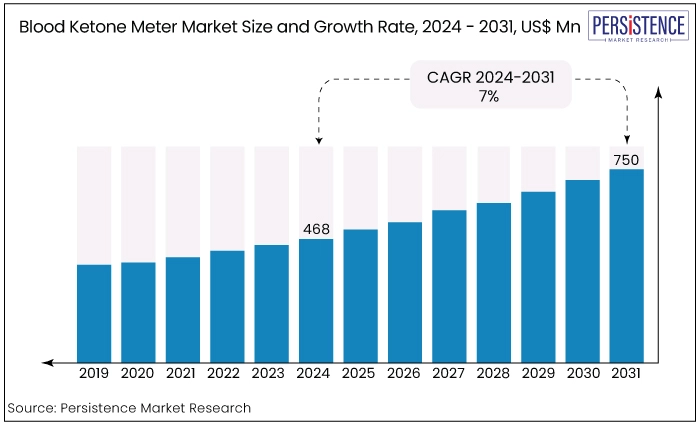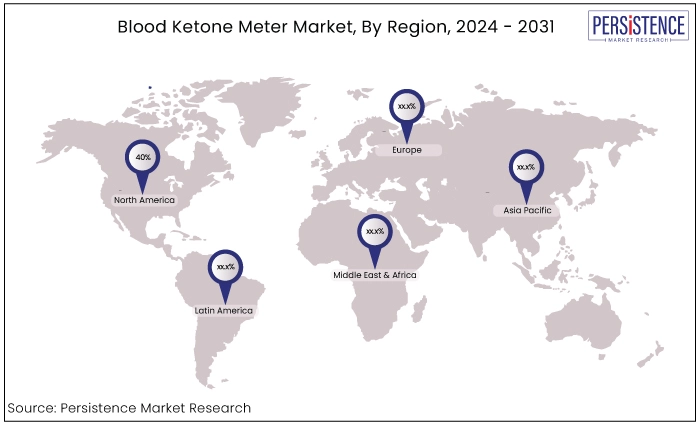Blood Ketone Meter Market
Industry: Healthcare
Published Date: August-2024
Format: PPT*, PDF, EXCEL
Delivery Timelines: Contact Sales
Number of Pages: 163
Report ID: PMRREP34737
The blood ketone meter market is estimated to reach a valuation of US$750 Mn by the end of 2031 from US$468 Mn recorded in 2024. The market is estimated to record a CAGR of 7%, during the forecast period 2024 to 2031.
Key Highlights of the Market
|
Market Attributes |
Key Insights |
|
Blood Ketone Meter Market Size (2024) |
US$468 Mn |
|
Blood Ketone Meter Market Size (2031) |
US$750 Mn |
|
Forecast Growth Rate (CAGR 2024 to 2031) |
7% |
|
Historical Growth Rate (CAGR 2019 to 2023) |
5.8% |

|
Region |
Market Value Share in 2023 |
|
North America |
40 |
The extensive use of blood ketone meters in the United States and Canada is poised to enhance market expansion significantly. Due to this, North America dominated the blood ketone meter market share owing to its advanced healthcare infrastructure and the significant investments made by the government in the healthcare sector.
The increasing prevalence of blood ketone meters, especially among those with diabetes, is a significant factor driving the growing demand in the sector. Additionally, North America market advantages from a significant number of patients, robust regulatory backing, and increasing recognition of the usefulness of such devices.
The region is characterized by many mergers, collaborations, and acquisitions carried out by prominent participants in the sector. The leading participants in the North America blood ketone meter market are now offering cutting-edge products, which is anticipated to drive market expansion in the projected timeframe.
The increasing incidence of diabetes, encompassing both type 1 and type 2 diabetes, has resulted in a heightened need for blood ketone meters in Europe. People with diabetes often depend on these devices to monitor and control their condition, which is remarkably accurate in instances of diabetic ketoacidosis (DKA) and when individuals adhere to ketogenic diets.
Increasing Prevalence of Diabetes Drives Europe Blood Ketone Meter Market
Europe's healthcare systems, firmly established in numerous nations, guarantee convenient access to medical instruments such as blood ketone meters through healthcare professionals, pharmacies, and hospitals. The availability of this feature is a significant factor driving the demand in the industry.
The prevalence of diabetes is increasing across Europe impacting persons across all age cohorts. Factors that contribute to this issue include poor food habits, lack of physical activity, and rising obesity rates.

|
Category |
Market Value Share in 2023 |
|
Product - Blood Ketone Monitoring |
42% |
The market for blood ketone is further segmented into blood ketone monitoring and blood glucose monitoring based on product. Among these two, the blood ketone monitoring segment dominates the market with value share of 42% recorded in 2023.
Monitoring blood ketone levels is essential to contemporary healthcare and wellness management, crucial in evaluating and preserving metabolic well-being. Blood ketone meters play a crucial role in enabling persons with illnesses such as diabetes, athletes, and those adhering to ketogenic diets to monitor their ketone levels. These devices have become essential tools in these contexts.
The blood ketone meter has experienced significant expansion and advancement in recent years, fuelled by the increasing recognition of the significance of ketone levels in diverse health scenarios.
|
Category |
Market Value Share in 2023 |
|
Application - Human |
60% |
The blood ketone meter market is further segmented into human and veterinary based on application. The application of blood ketone meter for human is largely observed. Blood ketone meters are crucial in weight management and dietary decisions.
People who adhere to ketogenic or low-carb diets utilize these gadgets to monitor their ketosis status, ensuring that they retain the ideal condition for effective fat burning. The blood ketone meters allow users to receive immediate ketone readings, which enables them to make well-informed dietary adjustments and improve their weight reduction progress.
There has been a notable increase in the number of human applications in the market due to its crucial function in monitoring and controlling different health issues. These devices are becoming essential tools for individuals and healthcare professionals who need precise information about ketone levels in the bloodstream.
A blood ketone meter is a device used to quantify the concentration of ketones in the bloodstream. This monitoring meter is the most precise method to assess ketones. Blood glucose meters can measure blood ketone levels in addition to glucose levels.
The market for blood ketone meter is primarily driven by the increasing prevalence of diabetes and the growing awareness of the importance of ketone monitoring among diabetic patients. Also, the market is being propelled by advancements in ketone meter technology.
This broader application of blood ketone meters beyond the diabetic population is expanding the market’s reach and driving its growth. Modern blood ketone meters offer fast, accurate readings and often come integrated with digital health platforms, enabling better data tracking and sharing with healthcare providers.
Glucose serves as a primary source of energy for the body. Ketones can be identified in either the blood or urine. The primary purpose of conducting a blood test to measure ketone levels is to detect the presence of diabetic ketoacidosis (DKA) in individuals with diabetes.
Ketoacidosis can occur when there is an excessive synthesis of ketones, leading to an acidic blood pH. Diabetes ketoacidosis (DKA) is a severe outcome of type 1 diabetes that occurs less frequently in type 2 diabetes. Therefore, individuals with diabetes must monitor their ketone levels.
The blood ketone meter market saw considerable growth leading up to 2023, driven by rising awareness of diabetes management and the ketogenic diet's popularity. Increased prevalence of diabetes and other metabolic disorders necessitated regular ketone monitoring, fueling demand for these devices.
Technological advancements, such as more accurate and user-friendly meters, have contributed to market expansion. Additionally, the growing trend of adopting ketogenic diets for weight loss and overall health further spurred the demand for blood ketone meters.
North America and Europe were the dominant regions, owing to high healthcare spending and greater awareness of the importance of ketone monitoring. Forecasting beyond 2024, the market for blood ketone is expected to grow strongly, with an anticipated CAGR of 7%.
Innovations in wearable health technology and integration with smartphone apps are likely to drive market expansion, providing users with real-time data and improved health management. Increasing global healthcare awareness, especially in emerging markets, will contribute significantly to growth.
Government initiatives promoting diabetes management and the rising popularity of telemedicine are expected to boost demand further. However, market growth could be tempered by the high cost of advanced meters and competition from alternative ketone measurement methods, such as breath analyzers.
Rising Prevalence of Diabetes and Metabolic Disorders
The increasing incidence of diabetes and other metabolic disorders is a primary driver for the market for blood ketone. With diabetes becoming a global health concern, there is a heightened need for practical monitoring tools to manage the disease and prevent complications such as diabetic ketoacidosis (DKA).
Blood ketone meters provide an essential function, allowing patients to track their ketone levels accurately. As healthcare providers emphasize the importance of regular ketone monitoring in diabetic care, the demand for reliable and easy-to-use blood ketone meters is expected to grow.
This trend is particularly significant in regions with high diabetes prevalence, such as North America, Europe, and parts of Asia, where the adoption of advanced medical devices is supported by robust healthcare infrastructure.
Growing Popularity of Ketogenic Diets
The rising popularity of ketogenic and low-carbohydrate diets for weight loss and health improvement is another crucial driver for the blood ketone meter market. These diets aim to induce a state of ketosis, where the body burns fat for energy instead of carbohydrates, leading to increased ketone production.
Individuals following such diets use blood ketone meters to monitor their ketone levels and ensure they are in the desired state of ketosis. The health and fitness community's growing interest in ketogenic diets has fuelled the demand for these devices.
The proliferation of online resources, social media, and wellness influencers promoting ketogenic diets has significantly raised awareness about the benefits of ketone monitoring, further driving market growth.
Technological Advancements and Integration with Digital Health
Technological advancements in blood ketone meters are significantly enhancing their appeal and usability. Modern devices are becoming more accurate, user-friendly, and capable of providing rapid results.
Integration with digital health platforms, such as smartphone apps and wearable devices, allows for seamless tracking and analysis of ketone levels over time. This integration offers users a comprehensive view of their health data, facilitating better health management and personalized care.
Advancements in sensor technology and non-invasive testing methods are making ketone monitoring more accessible and less cumbersome. As the digital health ecosystem expands, the synergy between blood ketone meters and other health monitoring tools is expected to drive market growth.
High Cost of Advanced Meters
The high cost of advanced blood ketone meters significantly restrains market growth. While technological advancements have improved the accuracy and functionality of these devices, they have also increased their price.
Cost barrier can be prohibitive, particularly for individuals in lower-income regions or those without adequate health insurance coverage. The high upfront expense and the ongoing cost of consumables, such as test strips, can deter potential users from adopting these devices.
The financial burden limits widespread adoption, especially in developing countries where healthcare budgets are constrained despite the clear benefits of regular ketone monitoring.
Competition from alternative ketone measurement methods, such as breath analysers and urine test strips poses a challenge to the blood ketone meter market. These alternatives are often more affordable and less invasive, appealing to users looking for cost-effective and convenient ways to monitor ketone levels.
The less invasive nature of breath and urine tests makes them attractive options for routine monitoring while blood ketone meters provide the most accurate readings. The availability and increasing accuracy of these alternative methods can divert potential customers away from blood ketone meters, impacting their market share and growth potential.
The preference for alternatives could restrain the expansion of the market for blood ketone meter as consumers weigh the benefits of accuracy against cost and convenience.
Expansion into Emerging Markets
Expanding into emerging markets represents a significant opportunity for the blood ketone meter market. Countries like Asia Pacific, Latin America, and Africa are experiencing rapid economic growth, leading to improved healthcare infrastructure and greater disposable incomes.
There is an increasing focus on addressing the rising prevalence of chronic diseases, including diabetes, which is becoming a primary health concern due to lifestyle changes and urbanization. Emerging markets present a vast, untapped customer base with growing awareness of the importance of health monitoring.
Governments and healthcare organizations in these regions are implementing initiatives to improve diabetes management and promote the use of advanced medical devices. These initiatives create a favorable environment for introducing and adopting blood ketone meters.
Multinational companies are increasingly investing in these markets, establishing local manufacturing facilities, and partnering with regional distributors to enhance accessibility and affordability.
The opportunity in emerging markets is further bolstered by educational campaigns and community outreach programs to increase awareness about diabetes and the benefits of regular ketone monitoring. These efforts can help overcome barriers related to a lack of understanding and cultural resistance, making blood ketone meters more acceptable to the local population.
The demand for practical diabetes management tools like blood ketone meters is expected to rise significantly as emerging markets continue to develop and prioritize healthcare. Companies that strategically position themselves in these markets and focus on affordability, education, and local partnerships are likely to experience substantial growth.
The leading competitors in the blood ketone meter market are primarily evaluated based on their product or service offerings, their financial statements, developments and the approaches implemented, the company's position in the global market scenario and its geographical reach.
Key competitors in the market employ crucial strategies like partnership deals, mergers and acquisitions, and business expansion deals to strengthen their hold on a particular region or a particular service offering.
Recent Industry Developments
Assure Tech, a biotechnology firm, announced advanced research, development, production, and distribution of diagnostic reagents, point-of-care testing, and biological materials and introduced a new platform that offers complete health solutions for dogs.
nsulet Corporation, a pioneering medical device company, announced its acquisition of the assets of Automated Glucose Control LLC (AGC), based in Palo Alto, California, that specializes in developing and commercializing top-tier automated insulin delivery technology.
|
Attributes |
Details |
|---|---|
|
Forecast Period |
2024 to 2031 |
|
Historical Data Available for |
2019 to 2023 |
|
Market Analysis |
US$ Million for Value |
|
Key Regions Covered |
|
|
Key Market Segments Covered |
|
|
Key Companies Profiled in the Report |
|
|
Report Coverage |
|
|
Customization & Pricing |
Available upon request |
By Product
By Application
By End Use
By Region
To know more about delivery timeline for this report Contact Sales

The market is estimated to be valued at US$472.9 Mn in 2024.
North America is the leading region in the market.
The market is estimated to exhibit a CAGR of 7% during the forecast period.
Abbott, APEX Biotechnology Corporation, TaiDoc Technology Corporation, EKF Diagnostics Holdings PLC, Nova Biomedical, are the leading companies in the market.
Blood ketone monitoring is the dominant product segment.